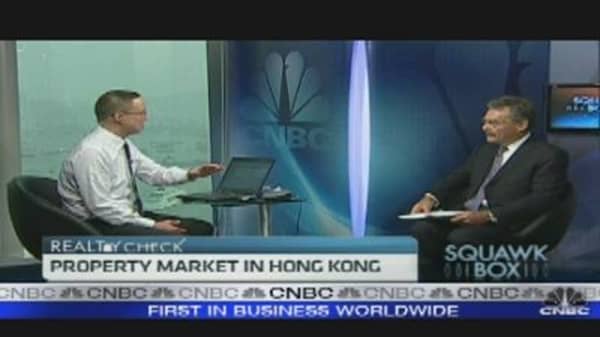Hong Kong's moves to rein in surging property prices have only served to shift investors' attention away from the residential market into commercial property, resulting in further increases in prices for the latter, Peter Churchouse, Chairman of Portwood Capital told CNBC on Tuesday.
Churchouse says rents for commercial property could go up between 40 and 60 percent, as supply remained very tight, and demand elevated.
"Hong Kong is producing way less floor space of all types than it used to 10, 15 years ago. So we've got a very strong economy, no question about that, credit is very cheap still, so you've got strong demand, low supply, economics 101 tells you prices have to go up in those environments," he explained.
Mortgage rates have edged higher in recent weeks in Hong Kong. The Hong Kong Interbank Offered Rate has risen from 1 percent to around 1.3 to 1.5 percent. But Churchhouse says they are still very low when compared to historical levels.
"Nowhere in the world can you borrow money to buy housing at that kind of level," Churchouse said. According to him, investors can buy property that yields 4 percent annually, while paying mortgage rates of 2 and a half percent per year, resulting in a positive carry.
The China Factor
But the big wild card, Churchouse cautioned, was China. Property prices in China grew at a slower rate in March, according to data released on Monday. Home prices rose 5.2 percent in March from a year ago, down from a 5.7 percent rise in February.
"I think we are going to see 20, 30 percent decline in property prices in China in the next 12 months," Churchouse warned.
Unlike Hong Kong, Churchouse pointed out China was facing the opposite problem of large supply but falling demand. "The number of daily property sales now in the last month or so are running in about half what they were in September last year. But the production of housing is going up by 40 percent."
While the bursting of a housing bubble in China would have ripple effects for the mainland economy, the fallout would be contained for Hong Kong, according to Churchouse, as the city's developers were more lowly geared. The net debt equity ratio among Hong Kong developers was less than 30 percent compared to an average 40 percent among China's top developers, he added.



